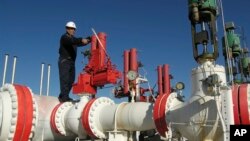A Russian warship firing warning shots against a Turkish fishing boat Sunday was the latest sign bilateral tensions continue to grow. But a potentially more significant sign of a permanent change in relations is Ankara's effort to end its dependency on Russian natural gas. But such energy diversification carries economic and political challenges.
Since Turkish-Russian relations soured over last month’s downing of a Russian bomber by Turkish fighter jets, Ankara has been seeking alternative energy supplies, from Qatar to neighboring Azerbaijan and beyond.
Global Source Partners consultant Atilla Yesilada said the move indicates there will no rapprochement anytime soon.
"This conflict is permanent since Ankara has no intention to change its Syria policy (opposing the regime of President Bashar al-Assad whom Russia supports). It understands that at the end we will need to reduce our dependence on Russian energy sources, which currently is 55 percent of our (Turkey's) natural gas supplies," Yesilada said.
Observers point out Ankara is contractually obliged to purchase Russian gas for the next three years, and it will take years for any new supplier to create the necessary infrastructure to fulfill all of Turkey's needs.
Bracing for supply cuts
Analyst Yesilada said the signing of a Liquified Natural Gas contract with Gulf state ally Qatar could be aimed at dealing with the potential threat of Moscow cutting gas supplies temporarily.
"In case Russia uses the excuse of technical problems to cut deliveries for short [the] term, Turkey has NG (Natural Gas) supplies, worth two to three days of Turkey’s needs. We can increase our LNG (Liquified Natural Gas) imports, but then at our ports we do not have enough terminals," Yesilada said.
Criticism is growing of the Turkish government for failing to build an infrastructure to support a more balanced energy strategy.
But Cumhuriyet newspaper political columnist Semih Idiz said even Ankara’s goal of long-term diversification faces major challenges.
"Turkey seems to be relying on Azerbaijan, and possibly some Central Asian republics, but people are forgetting how dependent these republics are on Russia, how much under Russia's shadow. So there are all sorts of difficulties for Ankara in trying to secure alternatives to Russia," Idiz said.
Ankara is also looking to Iraqi Kurdistan to meet some of its energy needs, but here too supply could be threatened by the Kurdish rebel group, the PKK, which Turkish forces are fighting. Observers warn energy diversification is becoming one of the most difficult and important challenges facing Ankara.




